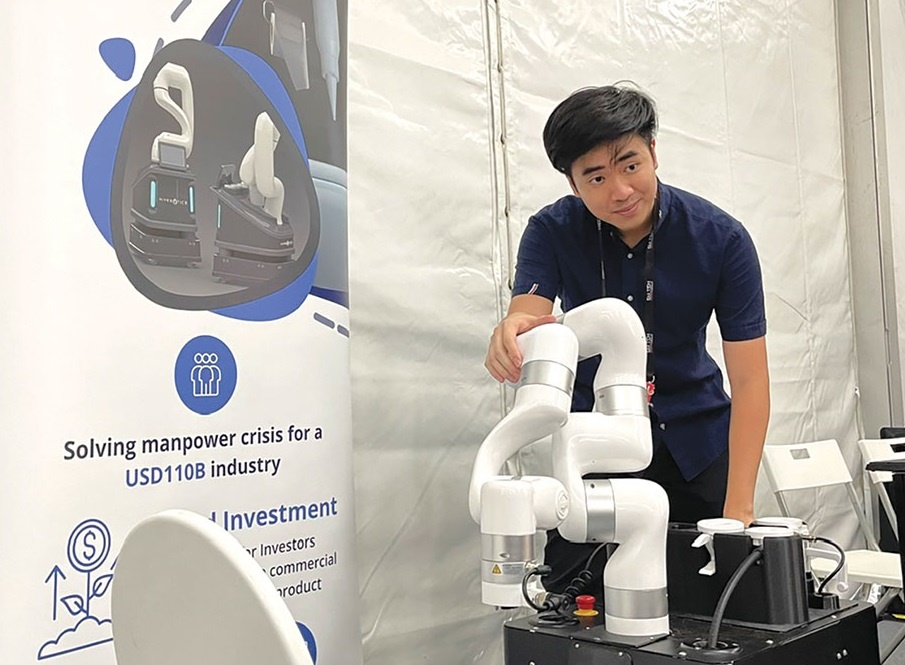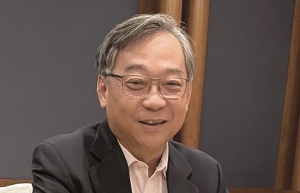Technology startups betting big on Vietnamese landscape
Dung Nguyen, co-founder and COO of Hivebotics, and his team are building hardware and software infrastructure that will lead to a general-purpose AI robot for commercial automation of menial tasks.
Arriving in Singapore in 2014 when he was a young Vietnamese student, Nguyen graduated in Singapore and decided to begin his journey with AI robot two years ago, after seeing a lack of toilet cleaning staff during the pandemic and amid great support of the local government.
Nguyen was in Singapore as part of the Week of Innovation and Technology (SWITCH 2023). The event took place from October 31 to November 2, with LaunchPad from JTC – a government agency under Singapore’s Ministry of Trade and Industry – championing sustainable industrial development, and driving innovation in the building and infrastructure sector.
LaunchPad is an all-in-one platform and community that gives businesses the tools, network, and support to grow. It has become a home to startups of varying sectors at different maturity stages.
“We chose to set up shop in LaunchPad Singapore thanks to its ecosystem of robotics startup as well as JTC support to provide us with testing space and domain knowledge in facility management,” Nguyen said.
“We are seeking opportunities in other markets outside Singapore. For the Vietnam, Thailand, and Indonesia market, we are looking for suppliers and manufacturing partners in our robotics domain. The pioneer application of our technology is an autonomous restroom cleaning robot for commercial buildings such as offices, malls, airports, hospitals, and hotels,” he added.
 |
| Some companies are pioneering impressive machines for offices, hospitals, malls, and more |
Regional magnet
Like Hivebotics, other tech startups are nurturing their dreams at LaunchPad Singapore and looking to venture into regional markets, with Vietnam being a target.
Founded in 2020, Zuno Carbon is an award-winning climate tech startup based in Singapore that helps businesses to track their emissions, report their environmental, social, and governance performance, and decarbonise their value chain. Its platform utilises optical character recognition, real-time optimisation, and generative AI to help companies manage their complex sustainability practices.
Tao Zhang, CEO of Zuno Carbon said that the company chose LaunchPad for its office location because of its thriving and vibrant startup scene. As the firm is entering a high-growth stage, it is fitting for it to find a place that shares its dreams and ambition.
“We are eyeing our growth in Southeast Asia, namely Indonesia, Malaysia, Vietnam, and Thailand due to the increasing demand for carbon emission management among businesses in the region. Many businesses in the region are heavy emitters within the agriculture, forestry, maritime, and manufacturing industries – some of the most highly regulated sectors due to their potential impact on the climate,” he said.
“With our solutions, we hope to enable better transparency and meaningful actions from key players in the region, so we can be on a better journey towards net-zero.”
Seeing growth potential in the Vietnamese market, where there is a high prevalence of nasopharyngeal cancer, Vivo Surgical, a Singaporean medtech company, is dedicated to developing innovative healthcare solutions that have profound clinical impact both within and beyond the confines of hospitals.
“Through strategic commercial and innovative partnerships across numerous international territories, our company is pioneering an endoscope robot, designed for advanced surgeries along the gastrointestinal tract. Complementing this technology is our portfolio featuring deep cavity surgical lighting and portable endoscopy solutions,” said Dr. Kevin Koh, founder and CEO of Vivo Surgical.
In conjunction with its clinical collaborator from the Duke Global Health Institute in North Carolina, Vivo Surgical has embarked on a clinical partnership with senior clinicians at the National Otolaryngology Hospital in Hanoi. Its collective focus has been on the development and refinement of its portable endoscope, specifically tailored for the comprehensive screening of nasopharyngeal cancer within primary care settings.
“Having successfully concluded clinical trials in the US, the device is now poised for evaluation across a network of more than 20 hospitals throughout Vietnam, with the objective of nationwide integration,” Koh added.
Elsewhere, ION Mobility is a tech and automotive startup on a mission to create and deliver sustainable mobility and energy solutions. Its products combine advanced hardware and software technology with human-centred design to deliver smart electric motorbikes and energy charging and storage solutions.
ION Mobility’s vision is to lead the transition towards a low-carbon economy across Southeast Asia.
“We have a 12-person team in Vietnam. We have a legal entity there, and are intending to establish a formal physical office in the country in the first half of 2024 to bring together our tech team and enhance collaboration,” said Anthony Ho, associate vice president for Business at ION Mobility. “We are also intending to commence vehicle approval with Vietnam’s Ministry of Transport in early 2024.”
Next wave of innovation
According to Enterprise Singapore, even amid the present economic climate, Singapore continues to be an attractive fundraising spot in the region for investors to seize opportunities.
Consequently, Singapore managed to draw in 64 per cent of Southeast Asia’s deal flow by volume in the first three quarters of this year, an increase from 54 per cent from last year. This amounted to 410 deals valued at a total of over $4 billion. Moreover, 15,000 people attended SWITCH 2023, a 50 per cent increase from last year.
Startup Genome’s Global Startup Ecosystem Report ranked Singapore second in Asia in 2023. In terms of global ranking, Singapore climbed 10 spots in 2023 to rank eighth in the world. Startup Blink ranked Singapore sixth globally and first in Asia.
Peter Ong, chairman of Enterprise Singapore said, “Capital is still flowing into Singapore, with a large majority of committed capital from venture investors flowing into Singapore-based venture capitalists (VCs).”
Today, Singapore’s 4,500 tech startups are supported by a vibrant network of over 400 VCs, 240 incubators and accelerators, as well as a strong base of scientific and research capabilities and corporate research and development labs.
Ong added that Singapore is becoming a deep tech hotspot for the region as the next wave of innovation. In recent years, interest in deep tech deals has been growing, with mRNA and AI becoming two game changers in this wave.
“Deep tech accounted for more than a quarter of the region’s total deal value in the first three quarters of 2023. This is the highest share compared to the same period in the past three years. And when compared with Southeast Asia, Singapore accounted for approximately three-quarters of the total deep tech deal volume,” he said.
The achievement is attributed to Singapore’s dynamic startup community, government funding, and global talent hunt.
Deputy Prime Minister of Singapore Heng Swee Keat at SWITCH 2023 said, “Given deep tech’s transformative potential, we must continue to broaden and deepen our ecosystem to support opportunities to make an impact. With the higher investment and longer gestation needed for deep tech, the promise of global reach and scale will not only enable deep tech innovations to pull in capital and talent, but also to achieve a global impact.”
 | Abundant potential for Vietnam-Singapore relations Vietnam and Singapore have been working closely to strengthen bilateral ties in the green and digital economy. Gan Kim Yong, Singapore Minister for Trade and Industry, spoke with VIR’s Minh Anh on the sidelines of the Singapore Week of Technology and Innovation 2023, about the next steps for bilateral relations. |
What the stars mean:
★ Poor ★ ★ Promising ★★★ Good ★★★★ Very good ★★★★★ Exceptional
Themes: Digital Transformation
- Dassault Systèmes and Nvidia to build platform powering virtual twins
- Sci-tech sector sees January revenue growth of 23 per cent
- Advanced semiconductor testing and packaging plant to become operational in 2027
- BIM and ISO 19650 seen as key to improving project efficiency
- Viettel starts construction of semiconductor chip production plant
Related Contents
Latest News
More News
- State corporations poised to drive 2026 growth (February 03, 2026 | 13:58)
- Why high-tech talent will define Vietnam’s growth (February 02, 2026 | 10:47)
- FMCG resilience amid varying storms (February 02, 2026 | 10:00)
- Customs reforms strengthen business confidence, support trade growth (February 01, 2026 | 08:20)
- Vietnam and US to launch sixth trade negotiation round (January 30, 2026 | 15:19)
- Digital publishing emerges as key growth driver in Vietnam (January 30, 2026 | 10:59)
- EVN signs key contract for Tri An hydropower expansion (January 30, 2026 | 10:57)
- Vietnam to lead trade growth in ASEAN (January 29, 2026 | 15:08)
- Carlsberg Vietnam delivers Lunar New Year support in central region (January 28, 2026 | 17:19)
- TikTok penalised $35,000 in Vietnam for consumer protection violations (January 28, 2026 | 17:15)

 Tag:
Tag:




















 Mobile Version
Mobile Version